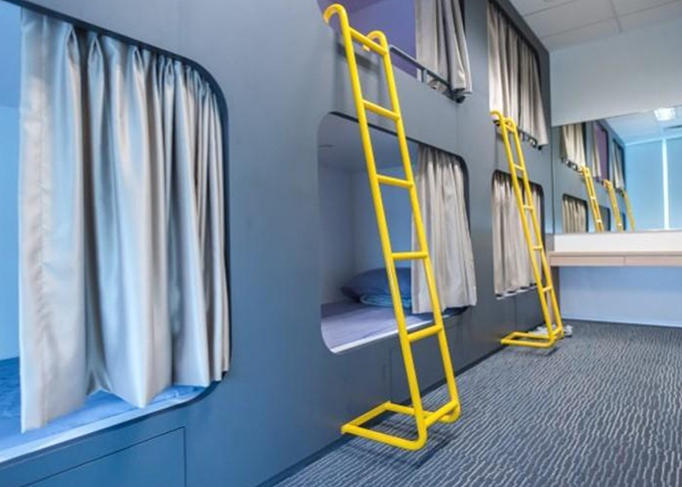
Sleeping pods and unlimited leave – gimmicky or genius? Recruiters weigh in on what matters to star tech employees.
Companies are pulling out all stops in the chase for tech talent. This goes beyond hiring the best talent, but figuring out how to make them stay.
Employees in the biggest companies in tech spend on average less than 2 years in their jobs, with Facebook boasting the longest average retention of 2.02 years. At Uber, employees spend an average of only 1.23 years.
Three experts – Prerna Agarwal from recruitment consultancy 33 Talent, who specialises in Technology recruitment in Asia Pacific; Sheryl Elnar, Salt, a global, award-winning digital recruitment agency‘s Practice Lead for Technology & Sales; and Lim Teck Yong, Regional Head of People team in Shopee – share their best practices for keeping tech talent around, even as job-hopping continues to be common in today’s workforce.
It may all boil down to a combination of positive work culture, benefits that demonstrate investment into employees’ well-being, and allowing them to make an impact, say Prerna, Sheryl, and Teck Yong.
Q: Tech talent is hot. So what is the secret sauce to retaining tech talent?
Prerna:
Tech talent is hard to find, so perhaps it is no secret that employees expect a fair compensation and benefits scheme. As a minimum, companies will need to offer a competitive package and regular pay rises.
But pay aside, talented individuals also scan employers for many other factors before deciding if they want to stay long in a job. One factor is company culture, especially a culture that is open, collaborative and positive. Another is simply the technology – tech talents want to be in an environment with opportunities to try out new technology. Finally, what kind of opportunities are there for them to grow in the company? This matters hugely as well.
Q: Tell me more about company culture. How does company culture affect how long tech talent stay in a job? What does good company culture look like?
Prerna:
A strong sense of culture has a direct impact on performance and mental health. And it’s a known fact that people who are happy in their roles and performing well, stay longer.
Company leaders play a huge part in directing company culture. Nobody wants to work for a bad boss, but a good manager will have good retention rates.
Sheryl:
I agree – a strong culture helps employees feel that they fit in and are part of a team that shares common goals. Retention is about creating an environment where employees want to stay because they feel valued and important to the organisation.
Companies that get this wrong often commoditise their staff and tend to forget the importance of camaraderie and close bonds within the organisation. Companies that have good retention have teams where there is a strong sense of connection and purpose, and leaders and HR heads must invest in bringing this about in alignment with their vision and values.
This begins with a tight induction process when they are first hired, with effective and transparent review and evaluation cycles. Only then will they make their business a magnet for competent, motivated, and loyal staff.
When candidates and employees have a culture and competency match, they are more likely to stay with the company and work in the best long-term interests of the company.
Teck Yong:
At Shopee, we place huge emphasis on developing our employees. We make sure our employees, from the most senior down to the most junior, get the chance to hone their skills, both technical and non-technical, in order to become well-rounded individuals. Besides on-the-job training by respective team leaders, we develop our employees through organised training classes, mentorship programmes and peer-to-peer learning.
For instance, our mentorship programme allows experienced professionals to guide our younger colleagues in personal and professional areas. As a base incentive for getting together, for example, we provide funds for mentors and mentees to utilise when paying for meals together.
Whilst we trust that our experienced professionals have much to offer, we believe everyone, regardless of seniority, has something special they can share with others. This inspired Shopee Academy’s “Brown Bag Lunch” series, where employees do a show-and-tell on a chosen topic. Whether the focus is on soft skills or an interesting passion project, employees are welcome to share their knowledge and experiences with fellow colleagues during an official lunchtime presentation.
This ground-up culture of learning is crucial to our company’s growth, as it rewards employees for taking ownership of learning and educating.
Q: Apart from developing a good company culture, tech companies are also renowned for great employee benefits – do these matter much to keeping tech talent happy?
Prerna:
Yes, employee benefits are important, as they have an impact on a few different areas of personal and professional development. For instance, well-being benefits such as a gym membership, yoga at the office, or running clubs impact personal health, whereas opportunities like conferences, events, or training impact career development.
These are especially important when it comes to maintaining a flexible work arrangement. Don’t forget, working in tech is difficult and challenging. As such, a flexible working arrangement and interesting team-building programmes help improve team morale, and other benefits like free lunches or shuttle services save the employees money. These can help boost the attractiveness of working in a particular company.
To put it simply: If you had two identical job offers, and the difference was better benefits, which would you choose?
Teck Yong:
Fundamentally, we envision the workplace to be where employees can come together to build meaningful connections – within and outside of the company. This guiding principle is reflected through our corporate benefits, employee engagement events and activities, perks, and office fixtures.
While it is important for our workers to continually challenge themselves, we think it is equally important to provide an inviting and comfortable work environment. The office has a large central café where our employees can enjoy a wide assortment of free snacks, drinks, coffee, and fruits, to keep them energised throughout the day. We also provide cereal and toast for a light breakfast usually, and offer a more filling option on Mondays. For those who stay late in the office, we provide on-demand dinner free-of-charge every night.
We also have pods available for a power nap, and a massage room with our own in-house masseuse. Employees are welcome to take the occasional snooze in the Nap Room, which is made up of six sleeping pods, with curtains for privacy. Our software engineers, who often work late into the night to build and scale our tech systems, find this particularly useful. Employees can also make appointments with the in-house masseuse up to twice a month – it’s no surprise that this service is always fully booked!
Sheryl:
Benefits are a way for the company to communicate the idea that the company cares for its staff. For instance, when it comes to families, big tech firms are huge on benefits.
Facebook has four months of parental leave for mothers and fathers, while Spotify offers six months of paid maternity or paternity leave, plus one month of flexible work options for returning parents, and Netflix has unlimited parental leave.
Similarly, giving that extra benefit adds that much more to the company’s offer. Take a look at Airbnb’s free vacations: The vacation rental listing site offers staff an annual US$2,000 (S$2,710) stipend to travel and stay in an Airbnb spot anywhere.
Free and unlimited vacation and services are also another way for companies to spoil their staff. HubSpot employees have unlimited vacation from day one. At Twitter, employees enjoy free laundry and dry cleaning services.
These unique employee benefits are important. They do not all have to be grand or cost the company lots of money. Essentially, these benefits make the employees feel a sense of importance and pride, which are the top reasons for employees to stay.
Q: That makes sense – it’s not the benefits that employees stay for, but the fact that these communicate a company’s commitment to investing in an employee’s well-being. What else keeps tech talent motivated?
Teck Yong:
Impact is extremely important. We believe our employees are motivated by the knowledge that we are making a positive impact in the lives of consumers and small businesses through technology.
For example, in Shopee, we empower small sellers and SMEs to benefit from technology to reach broader markets.
Prerna:
That is true – it’s all about the impact. Startups have one big thing going for them and that is that they are small and nimble. Working in a small startup means that staff feel like the work they do has a direct impact on the company, rather than a proposal which goes into a black hole. What they do counts, and that is very empowering.
Sheryl:
Yes, startups are appealing because they allow employees to be a major contributor to a new business. As an early member in a startup, employees have the ability to create something disruptive that solves a real life problem in a new way.
Often, candidates seek participation in the equity of the company as new companies with great ideas can provide a big payout if successful. Participation in equity that vests over time also strengthens their desire to stay with the company for the long term.
Q: These sound like great initiatives. We’ve been tossing the term “tech talent” around quite a bit – whom exactly are companies hoping to attract with these initiatives?
Prerna:
Companies look for talent with a solid tech background, someone who has a strong base and skills in the programming languages they need, as well someone who can work independently.
However, for many companies, the right attitude is more important than aptitude. They are looking for employees that are humble enough to learn, yet still have the drive to succeed.
Sheryl:
We have observed an increased emphasis on technical skills, but there is also an openness to transferable skills. Core skills like problem solving, general cognitive ability, lateral thinking, and abstract reasoning are often being tested.
But it’s no longer just about technical fit – companies now seek values alignment and communication skills. This may mean hiring staff that have a 100 per cent culture and values fit, but only an 80 per cent skill match.
Teck Yong:
We look for people who are not afraid to tackle new challenges, strive for excellence, and yet remain humble. Our staff are industrious, able to deal with uncertainty, and also flexible and agile.
Being in a startup-like environment with multiple fast-growing business units, our employees need to be able to react effectively to new challenges. That ability to adapt quickly, foresee problems before they arise, and work collaboratively in teams is what enables our business units to move at a fast pace.
Ultimately, our people truly define who we are as a company, and our efforts to attract, grow and retain them will define a large part of our long-term success.
This article originally appeared on Economic Development Board Singapore’s website.



